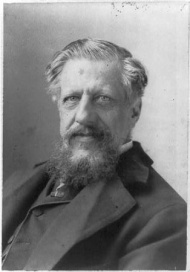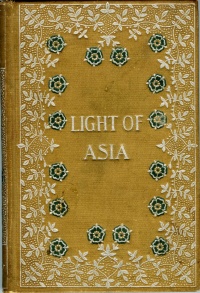Edwin Arnold
Sir Edwin Arnold, M.A., K.C.I.E., C.S.I.(June 10, 1832 – March 24, 1904) was an English poet and journalist, who is most known for his poetic life of Gautama Buddha, The Light of Asia.
Early life and career
Edwin Lester Arnold was born at Gravesend, Kent, on June 10, 1932, as the second son of a Sussex magistrate, Robert Coles Arnold. The young Arnold was educated at King's School, Rochester, King's College in London, and University College, Oxford. He won Oxford's prestigious Newdigate Prize in 1852, for a poem called "Belshazzar's Feast."
He took a position as a schoolmaster at King Edward's School, Birmingham for several years. In 1856 he accepted a post in India as Principal of the Government Sanskrit College at Poona and served there for seven years, leaving because of the ill health of his first wife. He mastered Sanskrit, Arabic, Turkish, and Persian.[1]
After returning to England, Arnold worked as a journalist at the Daily Telegraph, eventually becoming editor-in-chief of the Daily Telegraph during a forty-year career. His son Emerson Arnold wrote of this period:
Obliged by circumstances to remain under grey Western skies and labor for more than forty years in London on the staff of the 'Daily Telegraph, his heart remained in India and every moment of his scanty leisure was devoted to the study of her languages, religions and philosophy.[2]
Association with Theosophists
Early Theosophists greeted the publication of The Light of Asia in July, 1979 with glowing reviews. Madame Blavatsky herself wrote at length in the first issue of the Theosophical Society's journal The Theosophist in October, 1979. Other reviews, analyses, and quotations followed.
Arnold knew Helena P. Blavatsky well and expressed his admiration for her extraordinary mental attainments; he recalled an occasion when he asked if she knew the date of a Sanskrit grammarian and she was able to give it without hesitation.[3]
Colonel Henry Steel Olcott, President-Founder of the Theosophical Society, met Arnold in 1884. He gave this account shortly after Arnold's death in 1905:
I made his personal acquaintance at London in the year 1884, at the hospitable board of Mrs. Tennant... I lunched with him at his house and he kindly presented me with some of the original MS. of his world-famous Buddhist book. Later, when he revisited India, coming via Ceylon I organised, at the request of the high priest, Sumangala, his reception at Colombo, and drafted the address of the High Priest. His feelings towards me were cordial, and I may almost say that in him, I have lost a personal friend. His poetised translations from the Sanskrit most ably render the sense of the ancient books. He must have had a great faculty of concentration, for he told me, at his house, that he had written the most touching passages of The Light of Asia in the compartment of a railway carriage, in the company of some dealer sof Billingsgate market, who were loudly discussing between themselves, the price of fish.[4]
In a biographical sketch, Boris de Zirkoff wrote,
Judging by his works and his philosophy of life, Sir Edwin Arnold formed an integral part of the widespread spiritual Movement which was regenerated in the latter half of the nineteenth century. In part, his work paralleled that of the Theosophical Society, helping to make the religion and philosophy of Buddhism and Hinduism known and appreciated by the western world. The Light of Asia and The Song Celestial undoubtedly led to widespread interest in these subjects and helped to create an attitude in which theosophical ideas would be found congenial. We are all indebted to this great scholar.[5]
Founding of Maha Bodhi Society
In 1885, Arnold published articles in The Telegraph drawing attention to the Buddha Gaya (Bodh Gaya) Temple, site of Gautama Buddha's enlightenment. The temple had been abandoned and was in deplorable condition. On January 22, 1891, the Anagarika Dharmapala, accompanied by Japanese priest Kozen Gunaratna, visited the site, and felt a tremendous urge to take action. On May 31, 1891, the Budh-Gaya Mahabodhi Society was formed, with Arnold as one of the founding members. The High Priest of Ceylon, H. Sumangala was President, Col. Olcott was Director and Chief Advisor, and Dharmapala was General Secretary. The new Society solicited contributions to maintain a staff at the Buddha Gaya site, and the Society convened an International Buddhist conference at the site in October, 1891. The temple complex was gradually restored, and the Maha Bodhi Society continues to be active in India and several other countries.
The Light of Asia
The most famous of Arnold's works is The Light of Asia, a book-length poem depicting the life of Gautama Buddha. Published in July, 1879 in London and also by two companies in New York, the book immediately caught the attention of Theosophists. A lengthy review was printed in the very first issue of The Theosophist, in October 1879. The book was praised by the reviewer, Madame Blavatsky, for its literary qualities and for its treatment of the subject. The reviewer wrote, "if any Western poet has earned the right to grateful remembrance by Asiatic nations and is destined to live in their memory, it is the author of the "Light of Asia."[6]
Madame Blavatsky requested that each year on the anniversary of her death, her friends should gather and read from The Light of Asia and the Bhagavadgītā.[7] That tradition continues to this day among Theosophists around the world.
Numerous editions and translations have been produced since 1879, and the work is widely available in libraries worldwide.
Other writings
- "Belshazzar's Feast" - poem written while in college in 1856; won the Newdigate Prize for English Verse.
- Pearls of the Faith. (1883).
- The Secret of Death. (1885).
- Light of the World. (1891).
- The Song Celestial. (1885).
Son Julian as Theosophist
Sir Edwin's son Julian Tregenna Biddulph Arnold (3 July 1860 - 18 Jan 1954) was active in the American Theosophical Society:
In a recent number of The Messenger, I [the editor, A. P. Warrington] mentioned a series of lectures which Mr. J. B. Lindon, one of our members residing in Chicago, had given at Besant Hall under the designation "Twilight Talks." These lectures were so successful and drew such large audiences that a program of a new series of historical lectures has been announced by the same lecturer, which by the time this issue reaches the mails will be well on the way.
Our members no doubt have learned from recent newspaper accounts that Mr. Lindon is none other than Mr. Julian B. Arnold, the son of the late Sir Edwin Arnold, the illustrious poet, scholar and interpreter of Indian ideals, whom Theosophists the world over have loved and revered for his immortal work.
When Mr. Julian B. Arnold came to America seven years ago he launched out in the chemical business, and for that and other reasons he adopted an old family name, so that he became known as J. B. Lindon. Owing to the encouragement which he received in his recent venture in the lecturing field, he has felt that he should no longer suppress his real identity.
I am sure that all Theosophists will join me in the hope that Mr. Arnold may some day become widely traveled as a lecturer throughout our country, where we hope he will always feel that he has a true home.[8]
Julian B. Lindon was admitted to the American Theosophical Society on November 23, 1910, sponsored by Minna Kunz and Mrs. Kochersberger of the Adyar Lodge of Chicago. After July 16, 1915, he was known as Julian B. Arnold, according to membership records.[9] As Warrington hoped, Arnold did go on to a career as a lecturer.[10]
Other resources
- The Union Index of Theosophical Periodicals lists over 80 articles by or about Edwin Arnold. Many are simply quotations of his works.
Notes
- ↑ Ted G. Davy, "Arnold, Edwin," Theosophical Encyclopedia (Quezon City, Philippines: Theosophical Publishing House, 2006), 49. Available at Theosopedia.
- ↑ Emerson Arnold, "Edwin Arnold," World Theosophy v2 (1932), 978.
- ↑ Ted G. Davy, "Arnold, Edwin," Theosophical Encyclopedia (Quezon City, Philippines: Theosophical Publishing House, 2006), 49. Available at Theosopedia.
- ↑ Henry S. Olcott, "Sir Edwin Arnold," Supplement to The Theosophist 25.7 (April, 1904), xviii-xix.
- ↑ Boris de Zirkoff, "Arnold, Sr. Edwin," Collected Writings Volume 12 (Wheaton, Illinois: Theosophical Publishing House, 19xx), 717.
- ↑ "'The Light of Asia' as Told in Verse by an Indian Buddhist,"The Theosophist 1.1 (October, 1879), 20-25.
- ↑ Sylvia Cranston, H. P. B.: The Extraordinary Life and Influence of Helena Blavatsky, (New York: Putnam, 1993), 429.
- ↑ Anonymous [A. P. Warrington, editor], "Sir Edwin Arnold's Son," The Messenger 2.12 (May, 1915), 510.
- ↑ Membership Ledger Cards. Microfilm roll 1. Theosophical Society in America Archives.
- ↑ 1940 US Census.

